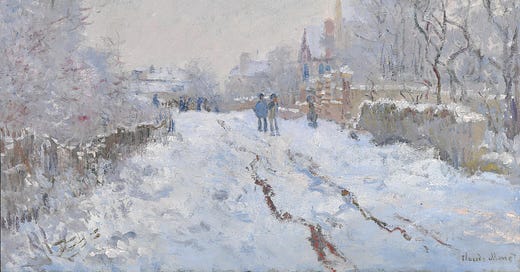Hello beloveds,
The sign of a well executed rest: I am so excited to return to this newsletter.
To those of you who are still here after my first-ever sabbatical in nearly four years of running this newsletter: thank you for sticking around.
To those of you who are new here: hello! We will be resuming regularly scheduled programming, with newsletters going out to everyone for the New and Full Moon every month and paid subscribers receiving the month-ahead astrology as well as extras for Mercury Retrogrades, Year Aheads, major planetary ingresses, and more. And everyone gets the semi-regular interviews with authors and publishing industry professionals (Melissa Febos! R.O. Kwon! My editor Jenny Xu!) about creativity and spirituality.
Excited you’re here.
Xx,
Jeanna
Last year around this time, I got deathly sick very, very fast.
Stuck in a hospital bed, there was no thought of celebrating Yule, or of my solar return, which falls on the winter solstice. There was only the waiting: for the next blood draw, for the morphine drip to kick in, for the doctors’ update, for my love to arrive for her next shift of sitting at my bedside.
In many ways, my lesson of this last year has been about waiting, or the kinder word we ascribe to its practice: patience. Not so patiently waiting months for my body to heal so that I could walk a full city block, or up a few flights of stairs. Waiting to be able to drink coffee again. Waiting to regain the mental capacity and focus to work on my book, to finish final edits well past its deadline.
And then, waiting for my book, Heretic, to come out. Waiting for people to pay attention to it. Waiting for it to be read. Waiting for what they would think.
So much waiting. Not always patiently. Often anxiously.
*
Winter can feel like a season of waiting, when the northern hemisphere’s cooler temperatures put the earth to sleep. Autumn’s decay surrounds us; Sagittarius’ embers finally burn out. See the leaves on the ground. Feel the snow crunch beneath your feet. Look at the sleet pelting the street. You do not want to go outside. You want to be cozy. Remember the storybooks you read when you were young, how the bears hibernated? How you thought that meant they slept all winter? Why can you not do that?
But a voice inside you insists: you must work. Heigh ho heigh ho, it’s off to work we go; see, our ancestors were industrious even during the Great Depression, so what excuse do we have? How deep does that indoctrination go, contrary to the earth’s cycles so evident around us?
The earth, our mother, is very purposeful about her rest. I wonder what she thinks, that we are not.
*
But the winter solstice is not just for rest. It is also for reflection, here at the shortest day and the longest night of the year.
The night is darkest just before dawn. A phrase sometimes attributed to 17th century English theologian Thomas Fuller, it is meant both literally and figuratively, and often as encouragement to those going through difficulties.
But when the night is dark, I don’t think of the promise of dawn breaking. Certainly, I did not when I was in the hospital, that darkest of 12th house places, last year. The oft-repeated promise of Psalm 30, that joy will come with the morning, seemed distant. In the witching hours of life, there is only eerie stillness and the constant echo of one’s own thoughts: the promise of an endless cavern. The interminable repetition of sleeplessness, of pain. Of what 16th century Spanish monk and mystic St. John of the Cross termed the dark night of the soul; in his poem of the same name, he writes:
In that happy night,
In secret, seen of none,
Seeing nought myself,
Without other light or guide
Save that which in my heart was burning.
Winter solstice is nothing if not a symbolic, collective dark night of the soul.
Historically, this solstice is a holiday to which many pre-Christian traditions pegged sun and savior gods, who brought the return of light and a symbolic rebirth. Some, like Ancient Roman Saturnalia, have been lost to time, while others, like the Persian Shab-e Yaldā (or Yaldā Night), have continued into the present day. The Christian Jesus’ Christmas is just one in a long line of deities celebrated around this time of year — although perhaps the most globally (in)famous. The promise of renewal. Of hope.
Joy does come with the mo(u)rning.
*
If observing the seasons and the cycles of the moon teaches us anything, it is that, as our lesbian foremother Mary Oliver once wrote, things take the time they take. And as writers, we doubly know this: that story cannot be rushed. That sometimes, the best gift we can give ourselves is the gift of time: of letting something stay on the backburner perhaps longer than we would like.
In this winter season, allow yourself to rest. If necessary, allow yourself to grieve. Allow yourself the discomfort of waiting, of cultivating creative patience. We all need to hibernate from time to time. A tree cannot constantly be in bloom, but goodness: have you ever seen those first buds in the spring?
I wish for you all a most blesséd solstice and restful winter.
Astrology for Writers will be busy this end of year with newsletters coming for the New Moon in Capricorn and (for paid subscribers only) the Mercury Retrograde and 2023 Year Ahead.
It also makes a great gift for the astro-inclined writer in your life:




Welcome back! So happy to see this newsletter pop back up in my inbox/Substack app. And what a lovely surprise to see Shab-e Yaldā mentioned at such a Christmas-dominant time of year. Blessed solstice to you ✨